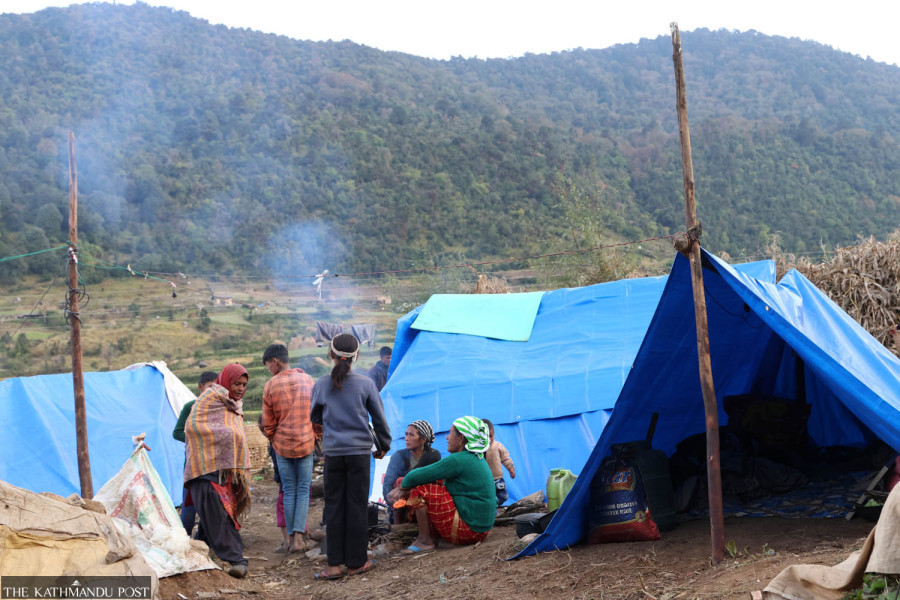National
Pork barrel fund idle as officials struggle to fund quake relief
Based on the number of registered beneficiaries, over Rs4 billion will be required to fund the temporary shelters.
Prithivi Man Shrestha
The government is yet to disburse the budget allocated for the controversial Constituency Infrastructure Development Programme to the victims of last November’s earthquake that hit Jajarkot and Rukum West on November 3 last year.
A Cabinet meeting on November 13 had decided to set aside Rs8.25 billion from the lawmakers-led programme for the rehabilitation of the affected people and reconstruction of the structures destroyed by the magnitude 6.4 earthquake.
According to the home ministry, the Jajarkot earthquake in early November killed 154 people while injuring 366 others. As per the late November update made by the home ministry, over 62,000 housing structures, both private and public, were damaged by the quake.
Then, the government had decided to release the budget allocated for the controversial scheme to support the quake victims. After the Supreme Court stayed the implementation of the controversial lawmakers-led programme in August last year, the allocated budget has stayed idle at the finance ministry.
“By arranging funds from other sources, we released a certain amount for the relief and rehabilitation of earthquake victims,” said Dhani Ram Sharma, spokesman at the ministry. “But the budget earmarked for the Constituency Infrastructure Development Programme has stayed with us unspent.”
He said the ministry had planned to release money from the programme for post-earthquake reconstruction, but the relevant authorities have not placed a demand for it. The government has yet to start reconstruction work as it prepares to conduct a detailed damage assessment caused by the earthquake.
Currently, the government’s priority has been to help quake victims to build temporary shelters. “So far, around 83,200 households have been registered as beneficiaries for grants to build temporary shelters,” said Bharat Mani Pandey, joint secretary at the National Disaster Risk Reduction and Management Authority.
The government has decided to provide Rs50,000 as relief to each family affected by the recent quakes to build temporary shelters.
According to Pandey, the finance ministry has so far released Rs1 billion for the purpose while the Prime Minister National Relief Fund provided Rs2 billion. Based on the number of registered beneficiaries, over Rs4 billion will be required to fund the temporary shelters.
With detailed damage assessment yet to be carried out, the finance ministry will be in no rush to release the budget allocated for the Constituency Infrastructure Development Programme.
As a case about the programme’s legality is sub judice, there are concerns of possible legal implications of distributing the allocated budget for it.
Last November, Sharma had told the Post that the budget meant for the controversial lawmaker-led scheme has been kept under the contingency heading in the finance ministry. “So, the ministry has the authority to transfer the budget to other headings,” he had said.
In its order, the Supreme Court had questioned whether lawmakers should undertake tasks that the executive bodies are supposed to handle.
Amid intense pressure from lawmakers, the government, through the budget for current fiscal year 2023-24, reintroduced the programme allocating Rs50 million to each of the 165 federal constituencies.
Under the programme, a minimum of Rs10 million has been allocated per project across various sectors, which include road construction, irrigation, water supply, education, health, tourism, and sports. This year’s budget has set aside a total of Rs8.25 billion for the programme.
Following a two-year hiatus, the federal government reinstated the programme, commonly known as a pork-barrel fund. In a similar vein, provincial administrations reinstated comparable initiatives in response to requests from local legislators.
Due to the court decision, the programme’s budget has remained unused in the finance ministry's contingency fund. Faced with difficulty in securing the required funds for distributing relief to the earthquake victims, the government had decided to mobilise the unused funds.
The programme has created controversy because of the unbridled authority lawmakers have in choosing projects and over alleged misuse of the money.
The federal government stopped funding the programme for two years and diverted the money to tackle the impact of the Covid pandemic.
The programme has also been controversial as resources allocated for it were channelled through entities run by individuals close to certain political parties. In order to implement projects under the programme, people involved in political parties and their sister organisations as well as non-governmental organisations close to the parties were chosen, in violation of the working procedures, according to a special audit carried out by the Office of the Auditor General in the fiscal year 2016-17.




 17.29°C Kathmandu
17.29°C Kathmandu















